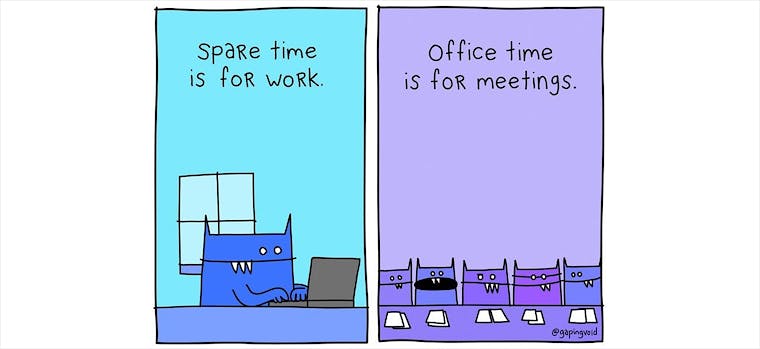Toxic Meetings = Corporate Torture (Here's How To Fix Them)

You probably attended one, maybe more, this week. Was it a department meeting, a one-on-one meeting, an update meeting, an alignment meeting or a meeting in another disguise? Whatever, it’s a meeting. And was it completely useless and boring, and a waste of your precious time?
In our old corporate jobs we were constantly kidnapped by this frustrating exercise. It felt like a 21st century form of torture.
The biggest frustration is the uselessness and inefficiency of most meetings. Which is why a columnist in The Economist recently proposed a cynical principle: “80% of the time of 80% of the people in meetings is wasted.”
The unbelievable numbers
Scientists from the University of Nebraska (Mroz, Allen, Verhoeven & Shuffler) recently showed that the The Economist was not far off. They said: “In the US alone, there are between 11 million and 55 million meetings each day, and employees average 6 hours per week in meetings.” Six hours each week! Six hours mostly wasted.
It gets worse. Managers seem to suffer even more “with averages around 23 hours per week and up to 80% of work time in meetings.” Eighty percent! How the hell can these people be productive or add value to their company?
The scientists also point to empirical evidence that implicates the gross inefficiency of this form of corporate torture. “As many as half of all meetings are rated ‘poor’ by attendees, with organizations wasting approximately $213 billion on ineffective meetings per year.”
Meetings are toxic
We also find resistance against useless meetings in popular management readings. Jason Fried & David Heinemeier Hansson (co-founders of American software company Basecamp) label meetings as toxic. (See their book Rework.)
They bombard meetings as the worst interruptions in our modern day workplace. And they give 7 solid reasons that (unfortunately) spark our imagination:
- “Meetings are usually about words and abstract concepts, not real things.” Check.
- “Meetings usually convey an abysmally small amount of information per minute.” Check.
- “Meetings drift off-subject easier than a Chicago cab in a snowstorm.” Check.
- “Meetings require thorough preparation that most people don’t have time for.” Check.
- “Meetings frequently have agendas so vague that nobody is really sure of the goal.” Check.
- “Meetings often include at least one moron who inevitably gets his turn to waste everyone’s time with nonsense.” Double check.
- “Meetings procreate. One meeting leads to another meeting, leads to another…” Check.
Meetings as a forum for engagement
Enough about the shite: it’s clear most meetings suck. Let’s focus on what we can do about them.
To be clear, we don’t think all meetings are shite. And we are not about banning all meetings in our workplaces. We are talking about banning the useless ones, the toxic ones, and the frustrating ones.
Meetings can be useful if practiced appropriately. The scientists showed that, if conducted appropriately, meetings are forums for many good things. Good meetings generate creativity, debate, discussion and new ideas.
They can also be vital for sharing information, solving problems and making decisions. All of these should result in clear next steps for moving work forward.

An evidence-based medicine
Luckily the researchers also gave us a medicine for holding better meetings. This is based on the knowledge of ~200 academic articles.
They provide up-to-date, evidence-based factors that promote good meetings. We list the best-practices as before, during and after the meeting:
Before meetings
- Call meetings only when (absolutely) necessary.
- Set clear goals and desired outcomes.
- Prepare agendas that are circulated in advance (and let people review them).
- Avoid long meetings.
- Keep meetings small by only inviting people with expertise and knowledge.
- Make sure meetings are relevant to everyone invited.
- Use technology to meet meeting objectives (i.e. video-conferences).
- Ensure that technology is working prior to meetings.
During meetings
- Make sure everyone arrives on time.
- Start and end on time.
- Follow the agenda with clear goals and outcomes for meetings.
- Actively encourage everyone to participate.
- Avoid complaining, dominating behavior, and inappropriate statements.
- Avoid unrelated activities, distractions, multitasking, and non-participation.
- Intervene when communication patterns become dysfunctional.
After meetings
- Send out action items directly after a meeting.
- Assess meeting satisfaction and quality directly after, to improve future meetings.
- Incorporate meeting satisfaction as part of employee engagement surveys.
- Critically examine routine meetings to determine their necessity and value.
Role of technology
The role of technology in meetings is tricky, and still not completely understood. Of course, we know technology can be extremely useful in bringing people around the world together.
But we also know technology can be terribly annoying and distracting. We all know colleagues who use their cell-phones and laptops during meetings. Fuck that. This kind of multitasking leads to distraction and frustrated co-workers. However, the evidence-based effects are not yet clear.
Try and fail, but don't fail to try
Whether you’re a front-line employee, team leader, senior manager or CEO, you too can increase the meeting quality within your team, department or organization. Start with the evidence-based tips above, no matter if the impact will be big or small. Just start experimenting, and then fine-tune your practice as you go.
Just as we like to say: Try and fail, but don’t fail to try!
To learn more about running fewer and better meetings, join our online course 'Run better meetings'.

